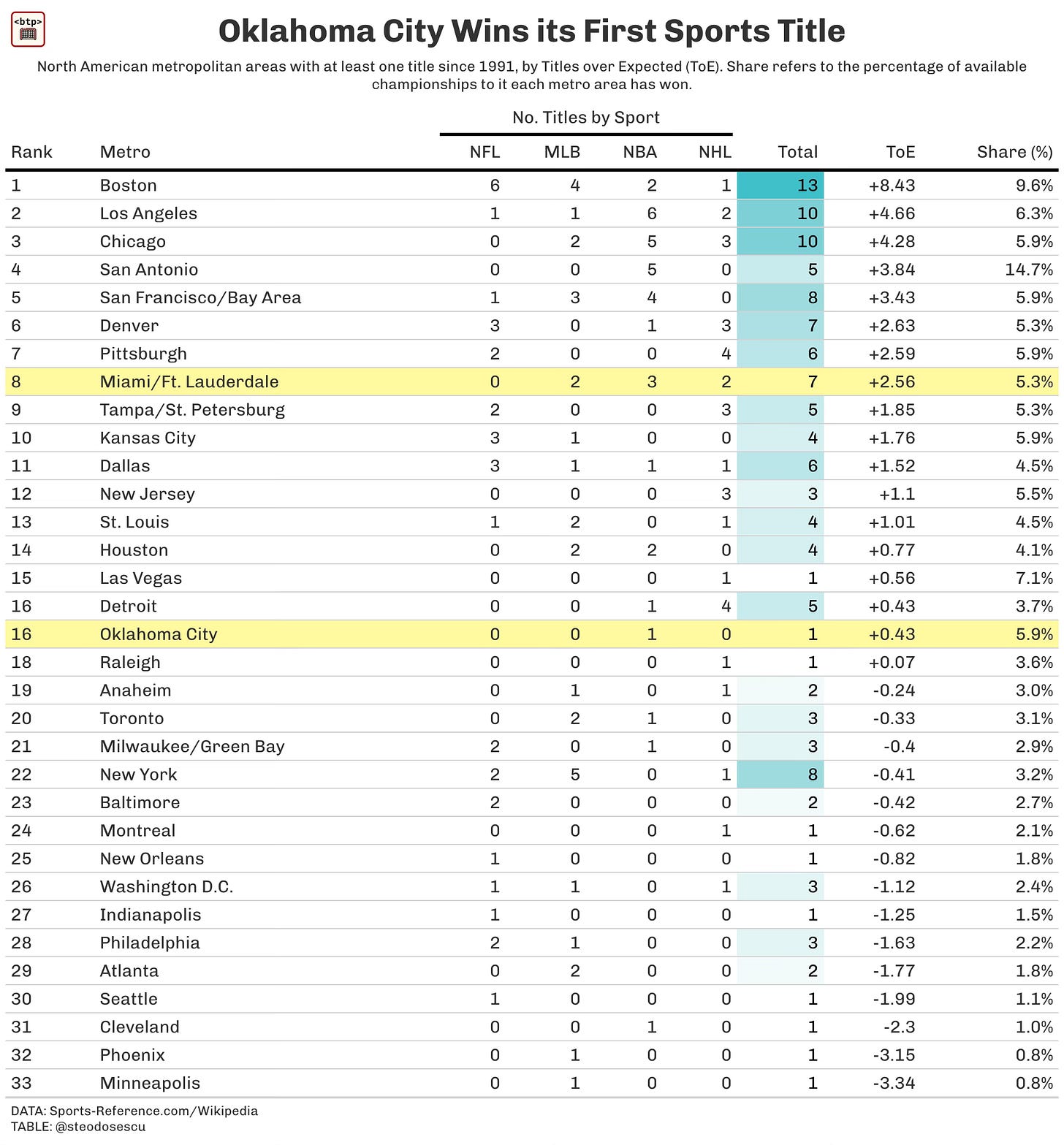OKC joins list of cities with a sports title to its name; Miami moves into Top-10 in Titles over Expected
The Oklahoma City Thunder won their first championship last week, while the Florida Panthers won their second straight Stanley Cup
The trendiest championship pick all season, and best team in the NBA, waited as long as possible to cap off a season many thought would be a foregone coronation after the domination it displayed during the regular season. The Oklahoma City Thunder beat the Indiana Pacers 103-91 in Game 7 last Sunday night to capture its first ever NBA championship, and with it, the city’s first ever sports title.
Meanwhile, the Miami/Ft. Lauderdale metro area moved up two places in my Titles over Expected1 rankings — overtaking Kansas City and Tampa/ St. Pete — with the Florida Panthers’ Stanley Cup championship earlier in the week.
The Thunder won the city’s first title after the SuperSonics franchise relocated from Seattle in 2008. Because OKC has a single sports team, we would expect the area to produce one championship every 30 years2, assuming complete parity in the league. Thus, its NBA title this season put Oklahoma City ahead of schedule; it now sits at +0.43 Titles over Expected as a city.
On the hockey side, Florida’s victory means Canada was once again denied a Stanley Cup championship — the country that invented the sport of hockey hasn’t won since 1994, a fact that continues to be mathematically laughable. Meanwhile the state of Florida has won five trophies in that time (2x for the Panthers, 3x for the Tampa Bay Lightning).
Miami/Ft. Lauderdale was actually underperforming championship expectations up until the Panthers’ first Cup run last season. But the region has now jumped into eighth place on the list with +2.56 more titles than expected since 1991. The other championships have come from MLB’s Miami Marlins (née Florida Marlins) in 1997 and 2003, and three NBA titles thanks in part to the “Big Three” of the Heat in 2006, 2012 and 2013.
Titles over Expected is a metric I created to quantify how a region is indexing against others in sports championships won. As I documented in a previous post about the topic the methodology and assumptions I employed to arrive at this metric is as follows:
I looked at the metropolitan areas where championships were won in the four North American men's professional sports leagues -- the NFL, MLB, NBA and NHL.
I arbitrarily used 1991 as the starting point because that was the year I was born.
I'm defining teams' markets as the metropolitan areas in which their fans are typically found. For example, I'm lumping all of Wisconsin's major professional sports teams into the greater Milwaukee area because the Green Bay Packers, who play their home games two hours north at Lambeau Field, called Milwaukee home for a portion of their games through the 1990s and are effectively the entire state of Wisconsin's team. Similarly, the Golden State Warriors, who won multiple NBA titles while based in Oakland, Calif., would be considered part of the San Francisco Bay Area.
The New York Giants and New York Jets are included as New York City teams, despite the fact both teams play in New Jersey. The NHL's New Jersey Devils are the lone Jersey team in this analysis.
An important call out is we are assuming every team in a league has an equal chance of winning a championship each season, a fact we know isn't true in practice. Those chances vary across different sports as well. The NBA, for example, is much more deterministic than a sport like hockey -- hockey is inherently random given the units of success (goals) don't happen very often, unlike in basketball where 100+ points scored is the norm in an NBA game.
There are currently 30 teams in the NBA. If titles were divided evenly, each team in a given league should win once every 30 or 32 years, depending on league size. More teams means higher chances at a title in any given year.





